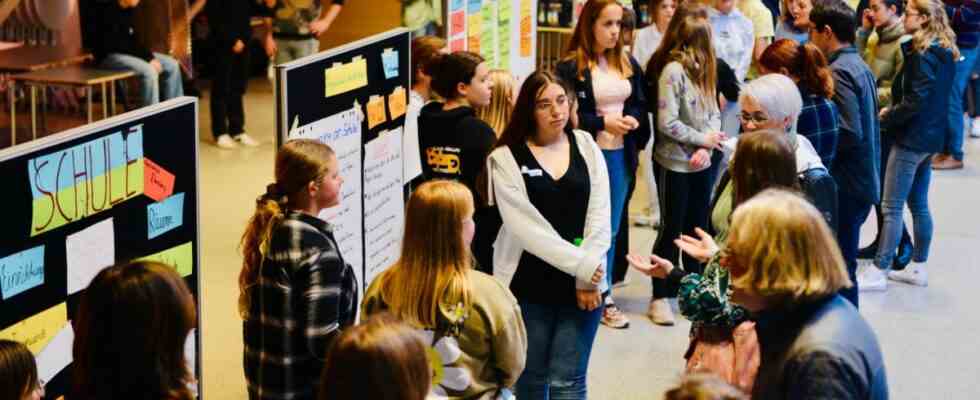There are said to have been a little more than 340 topics after the first run. Young people came up with so many thoughts and ideas when it came to what those responsible in the city of Ebersberg could do better. At least these girls and boys, who presented their wishes and suggestions for improvement in the old warehouse on Tuesday afternoon, showed nothing of the youthful disaffection with politics that is so often claimed.
The project, through which eighth-graders from the Ebersberg middle and secondary schools came together, has been tried and tested in Germany and especially in Baden-Württemberg – but the city of Ebersberg was the first municipality in Bavaria to implement it. And she will now do this every year, for each of the eighth graders. Accordingly, the project is called “Achter-Rat” and is a political participation format with the aim of enabling all young people to have a positive first experience of democracy in order to motivate them to participate further in society. In the district town, the project is organized by the city youth welfare and supported by the district youth council and the partnership for democracy as cooperation partners.
The young people worked out 16 specific concerns
In a first conference, the around 90 young people identified topics that were relevant to them – this resulted in the 340 suggestions already mentioned. On the second day of the project, the eighth graders worked out their ideas for 16 specific topics in project groups and put them on large posters. These were now set up in turn in the hall of the old warehouse. The invited members of the city council, Mayor Ulrich Proske and other responsible persons such as teachers and administrative staff were asked to go from one group to the next and to talk to the young people about their wishes. The adults could enter their contact details on a piece of paper if they felt responsible for the topic and would like to support the respective project in the future.
The concrete topics of the eighth graders were diverse: It was about bike paths, school buses and public transport, digitization at school and school in general, sports facilities, swimming pools and public spaces as well as rooms for young people, events, shopping facilities and cinemas as well as the area Security.
Most of the adults were very interested in the students
“Some young people believe that they are not interested in what they have to say,” Karola Kellner explained to the adults in advance. The local councilor from Rosenheim moderated the workshop. She therefore urgently asked for active dialogue with the students.
That’s what the politicians and other responsible people did – at least most of them did. However, there were also a few adults walking from group to group, at least in pairs, talking more to each other than to the young people on the topic at hand. Even when a couple of eighth graders offered to introduce their topic to the adults, they politely declined. You are not responsible for this field.
The students in this group were very disappointed – by the way, they spoke out in favor of a cleaner monastery lake and more sports areas next to the water. “They could at least say that they would tell the town hall about it,” complained one boy. But he didn’t feel like he was being taken seriously, he said, pointing to the slip of responsibility next to the poster: nobody had registered there at the time. Most of the time, the guests would listen to their presentation, but ultimately just move on. No further explanations were needed – the boys showed frustration and didn’t understand the behavior of the adults.
One group criticized the structural condition of the Realschule
In other areas, on the other hand, the picture was very positive. For example, two students whose group criticized the state of the Realschule – broken chairs, crumbling plaster, partitions to protect against spiking that caused headaches because of their appearance – said they felt respected. Even the headmaster came and talked to them for a long time. Later, Mayor Proske assured all the young people that he would speak to the person responsible for material expenses, the district, on this subject.
All in all, one thing was striking: many of the suggestions made by the young people could be solved quickly. Tampons and pads as well as more rubbish bins for disposing of hygiene items in the girls’ toilets at schools. A new basketball hoop. More places to sit and generally spend more time outdoors. A hot meal at school. In the end, Mayor Proske promised that all ideas would be dealt with.
In the end, the first two mayors were on the list of responsibilities
By January at the latest, the organizers Clemens Scheerer, who is responsible for the “Partnership for Democracy” project at the district youth council, and Ebersberg’s youth worker Christian Zeisel will send the eighth graders documentation of the posters. In February, the young people then have the opportunity to continue working on the topics in their free time in groups coordinated by Scheerer and Zeisel. “We are here for you,” said Scheerer in conclusion.
And even the guys from the group, who had been so disappointed just a short time before, now seemed happy about the project day. They proudly pointed once more to their slip of paper – the names of the first two mayors of the city were there now.

